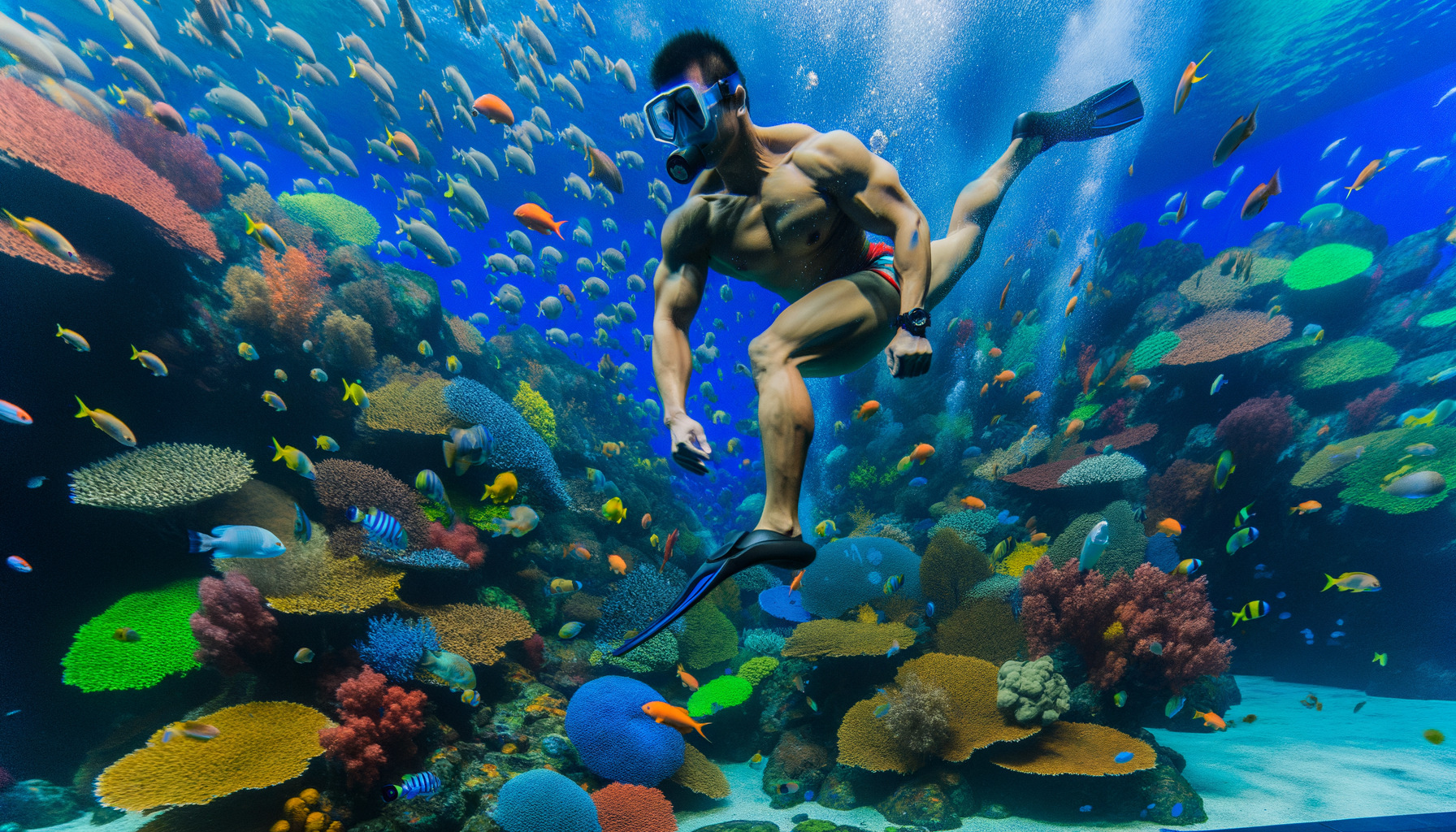Optimizing Nutrition for Freediving and Underwater Sports
Freediving and other underwater sports are highly demanding activities that require a meticulous approach to nutrition to ensure optimal performance and health. Here’s a comprehensive guide on how to tailor your diet for these intense sports.
Understanding Calorie Expenditure in Freediving
Freediving is an energy-intensive activity that involves holding your breath and diving to significant depths without scuba gear. This process engages both anaerobic and aerobic metabolic cycles, leading to a substantial calorie burn. A study suggests that freediving can burn approximately 1,000 to 1,200 calories per hour, with some estimates as high as 20 calories per minute for a 175-pound diver.
The high calorie expenditure is not only due to the physical demands during the dive but also the post-dive recovery phase, which involves the rebuilding of muscle tissue and the burning of fats through Excess Post-Exercise Oxygen Consumption (EPOC).
Nutritional Tips for Freedivers
To optimize performance and ensure adequate fueling for freediving and other underwater sports, here are some key nutritional tips:
Macronutrient Balance
A balanced diet is crucial for freedivers. It is recommended to have a diet consisting of 55% of calories from carbohydrates, 35% from protein, and 15% or less from fats. This balance helps in providing the necessary energy for muscle function and recovery.
Include fresh whole foods such as natural lean proteins like chicken, fish, beef, turkey, tofu, and lean pork. Vegetables and fruits should be a significant part of your diet to provide essential nutrients and fiber. Whole grains like quinoa, rice, and sweet potatoes are excellent sources of carbohydrates.
Mindful Eating
Practice mindful eating by focusing on your hunger rather than eating out of boredom or stress. Eating small, frequent meals can help avoid cravings and overeating. Be aware of the calorie content in beverages, as they can be high in sugar, fats, and stimulants. Prioritize water and low-calorie drinks.
For snacks, opt for fresh fruit or a little piece of extra dark chocolate to avoid restrictive eating that might lead to bingeing later on.
Pre-Dive and Post-Dive Nutrition
Pre-Dive Meals
A good rule of thumb is to have a balanced meal around 2-3 hours before freediving. For example, a bowl of oats with some fruit and nuts can provide sustained energy. Other options include whole-grain toast with almond butter or a light meal of grilled chicken with mixed greens and whole grains.
Post-Dive Nutrition
Once you return from a freediving session, it is essential to eat as soon as possible. Opt for wholesome, balanced, and nutritious meals. Include carbs like sweet potato, pumpkin, or quinoa, protein from lentils, eggs, or fish, and healthy fats from avocado or cold-pressed oils. Adding steamed veggies or a salad with sprouts, fermented veggies like sauerkraut or kimchi, and nuts and seeds can support your digestion and immune system.
Hyperbaric Health Considerations
Underwater activities, especially those involving depth and pressure changes, have specific health considerations:
Hydration
Proper hydration is crucial to avoid dehydration, which can exacerbate the effects of pressure changes. Drinking plenty of water before, during, and after diving is essential.
Nutrient Balance
Ensuring a balanced diet helps in maintaining the body’s ability to cope with the stresses of diving. A diet rich in fruits, vegetables, whole grains, lean proteins, and healthy fats provides the necessary nutrients to support overall health and recovery.
Post-Dive Recovery
Adequate nutrition post-dive is essential for recovery. This includes replenishing energy stores and supporting muscle repair. A meal plan that includes balanced macronutrients and essential nutrients can help in this process.
Real-World Examples and Case Studies
Many freedivers and underwater athletes have reported significant weight loss and improved physical condition through a combination of regular diving and balanced nutrition. For instance, a diver who started freediving a few hours a week reported losing 10 pounds over three months despite maintaining a high food intake. This weight loss is attributed to the high calorie burn associated with freediving.
Using Calorie Tracking Tools
Managing calorie intake and expenditure is vital for freedivers. Here are some tools and strategies to help you track your calories effectively:
- Calculate Your Calorie Needs: Use general guidelines such as adding a zero to your body weight to estimate your daily calorie needs, and adjust based on your specific activities and metabolic rate.
- Use Calorie Tracking Tools: Utilize apps, food count books, or online resources like the Calorie Calculator Cloud to track your calorie intake and expenditure. These tools can help you stay on top of your nutritional needs and ensure you are fueling your body adequately for your activities.
- Practice Mindful Eating: Eat small, frequent meals and focus on hunger rather than boredom or stress. This approach helps in maintaining a balanced diet and avoiding overeating.
Conclusion and Action Plan
Optimizing your nutrition for freediving and underwater sports involves a combination of balanced macronutrient intake, mindful eating, and proper hydration. Here’s a summary of key points to consider:
- Balance Your Macronutrients: Focus on a diet rich in carbohydrates, moderate in protein, and low in fats.
- Use Calorie Tracking Tools: Utilize apps or online resources to track your calorie intake and expenditure.
- Practice Mindful Eating: Eat small, frequent meals and focus on hunger rather than boredom or stress.
- Stay Hydrated: Drink plenty of water before, during, and after diving.
By following these guidelines and using the right tools, such as the Calorie Calculator Plans, you can optimize your nutrition and performance in freediving and other underwater sports.
Remember, consulting with a healthcare professional or a registered dietitian can help tailor dietary recommendations to your specific needs and goals, ensuring you are fueling your body optimally for these demanding activities.








